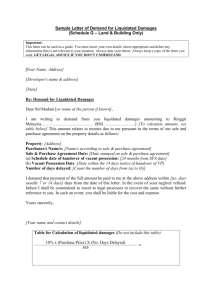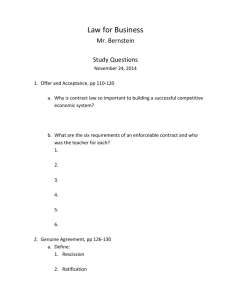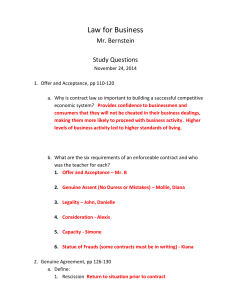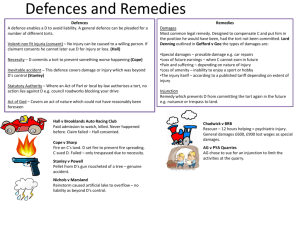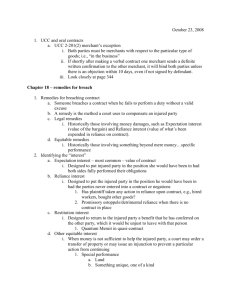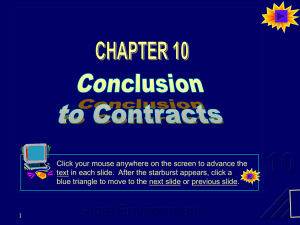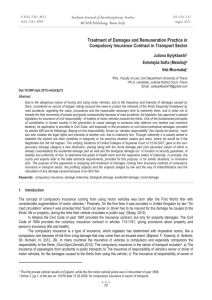1133587496_370668
advertisement
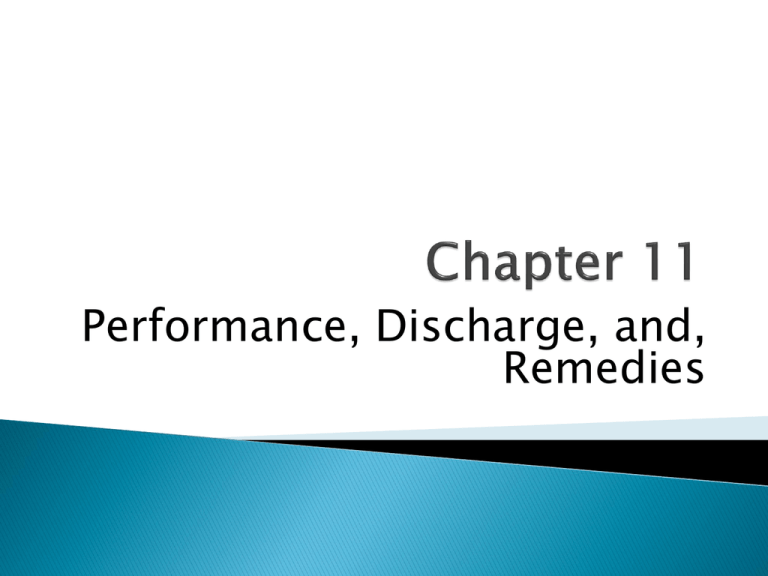
Performance, Discharge, and, Remedies “If you can’t give me your word of honor, will you give me your promise?” Samuel Goldwyn, Hollywood producer “Everyone complains of his memory, none of his judgment.” Francois, duc de la Rochefoucauld, French writer Discharge: Party is discharged when it has no more duties under a contract Most contracts are discharged by full performance Sometimes the parties discharge a contract by agreement Rescind: Terminate contract by mutual agreement Strict performance: Requires one party to perform its obligations precisely, with no deviation from the contract terms Substantial performance: Occurs when one party fulfills enough of its contract obligations to warrant payment ◦ A party that fails to perform substantially: Receives nothing on the contract and will only recover the value of the work, if any Parties to a contract must carry out their obligations in good faith The difficulty is applying this general rule to: ◦ Wide variety of problems that may arise Generally make contract dates strictly enforceable Merely including a date for performance does not make time of the essence When one party breaches a contract, the other party is discharged Material breach ◦ Generally courts will discharge only if a party committed a material breach Statute of limitations: Will limit the time within which the injured party may file suit True impossibility ◦ Something has happened making it utterly impossible to fulfill the promise Generally limited to: Destruction of the subject matter Death of the promisor in a personal service contract Illegality of the contract Commercial impracticability ◦ Some event has occurred that neither party anticipated, making the contract extra-ordinarily difficult and unfair to one party Frustration of purpose ◦ Some event has occurred that neither party anticipated and the contract now has no value for one party A remedy is the method a court uses to compensate an injured party Interest: A legal right in something Expectation interest ◦ Designed to put the injured party in the position she would have been in had both sides fully performed their obligations Direct damages: Flow directly from the contract Consequential damages: Resulting from the unique circumstances of this injured party Incidental damages: Minor costs that the injured party suffers when responding to the breach Reliance interest ◦ Puts the injured party in the position he would have been in had the parties never entered into a contract Restitution interest ◦ Designed to return to the injured party a benefit that he has conferred on the other party Equitable interest ◦ When money is not sufficient to help the injured party: Court may order a transfer of property or may issue an injunction to prevent a particular action from continuing ◦ Specific performance: Forces both parties to complete the deal ◦ Injunction: Court order that requires someone to do something or to refrain from doing something Preliminary injunction Permanent injunction Mitigation of damages ◦ A party may not recover for damages that could be avoided with reasonable efforts Mitigate: To keep damages as low as possible Liquidated damages: Clause stating in advance how much a party must pay it if it breaches ◦ A court will generally enforce a liquidated damages clause if : At the time of creating the contract it was very difficult to estimate actual damages Liquidated amount is reasonable
